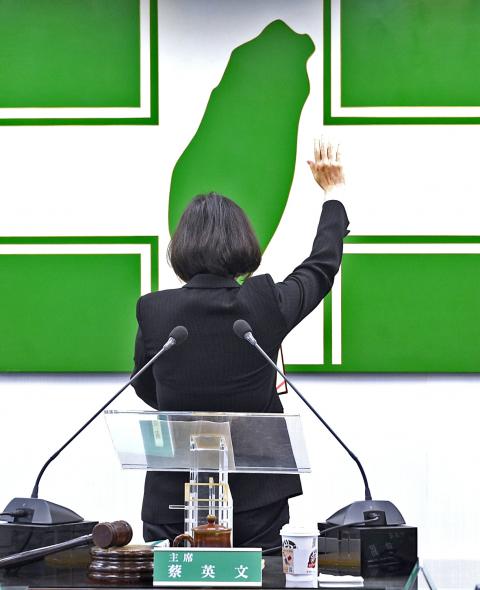President Tsai Ing-wen (蔡英文) was yesterday sworn in as the 16th Democratic Progressive Party (DPP) chairperson, calling for passion and calm, and averring that “change has already taken place” with the Executive Yuan’s dropping of charges against the Sunflower movement activists.
In the first DPP Central Executive Committee meeting after the presidential inauguration on Friday, Tsai was sworn in as party chief in accordance with the party’s constitution, which stipulates that the president is ex officio chairperson of the party.
Tsai said the DPP has again become the ruling party, but it now has different missions to complete and goals to achieve.

Photo: Chen Chih-chu, Taipei Times
“As all of you have seen, on May 20, I outlined the problems that Taiwan is facing to remind everybody that the public expects the DPP to solve these problems one by one at a stable pace,” Tsai said.
Fervor or sensationalism will not solve problems, but rather “vision, rational thinking and effective communication through which the power of reform can be maximized and repercussions minimized,” Tsai said, adding that what the people wish to see is not “another Chinese Nationalist Party (KMT) or the DPP that governed last time.”
“Passion, not fervor, and calmness, not indifference, will be the governing style of the DPP, and I believe this is the governing attitude that the country needs,” she said.
“We are to push for changes in this nation with this attitude in the next four years,” she said.
Tsai cited as an example the Executive Yuan’s dropping of charges against student activists who stormed into its compound during the Sunflower movement in 2014.
“It is because we believe that the government should have an empathetic and understanding attitude when facing the people’s fury,” she said.
“From now on, schools can no longer punish students for not following school regulations on uniforms and appearances, because we believe that young people should learn to take responsibility for themselves so they will be able to take responsibility for the nation and society,” Tsai said.
She was referring to the recent pronouncement made by the Ministry of Education that forbids school administrations from punishing students for their attire and appearance.
“This is only the beginning. In the days that follow, we are to create more changes, as we have already started the reforms on transitional justice, the pension system and the judicial system,” Tsai said.
“I would like to remind all of you that the higher the public’s expectations, the stricter their examination would be. We now have to accept public’s rigorous scrutiny,” she said.

Chinese spouse and influencer Guan Guan’s (關關) residency permit has been revoked for repeatedly posting pro-China videos that threaten national security, the National Immigration Agency confirmed today. Guan Guan has said many controversial statements in her videos posted to Douyin (抖音), including “the red flag will soon be painted all over Taiwan” and “Taiwan is an inseparable part of China,” and expressing hope for expedited reunification. The agency last year received multiple reports alleging that Guan Guan had advocated for armed reunification. After verifying the reports, the agency last month issued a notice requiring her to appear and explain her actions. Guan

GIVE AND TAKE: Blood demand continues to rise each year, while fewer young donors are available due to the nation’s falling birthrate, a doctor said Blood donors can redeem points earned from donations to obtain limited edition Formosan black bear travel mugs, the Kaohsiung Blood Center said yesterday, as it announced a goal of stocking 20,000 units of blood prior to the Lunar New Year. The last month of the lunar year is National Blood Donation Month, when local centers seek to stockpile blood for use during the Lunar New Year holiday. The blood demand in southern Taiwan — including Tainan and Kaohsiung, as well as Chiayi, Pingtung, Penghu and Taitung counties — is about 2,000 units per day, the center said. The donation campaign aims to boost

The Kaohsiung Tourism Bureau audited six hotels in an effort to prevent price gouging ahead of Korean band BTS’ concert tour in the city scheduled for Nov. 19, 21 and 22 this year. The bureau on Friday said that the audits — conducted in response to allegations of unfair pricing posted on social media — found no wrongdoing. These establishments included the local branches of Chateau de Chine, Hotel Nikko, My Humble House, and Grand Hai Lai, it said, adding that the Consumer Protection Commission would have penalized price gougers had the accusations been substantiated. The bureau said the Tourism Development Act

The Central Weather Administration (CWA) said a magnitude 4.9 earthquake that struck off the coast of eastern Taiwan yesterday was an independent event and part of a stress-adjustment process. The earthquake occurred at 4:47pm, with its epicenter at sea about 45.4km south of Yilan County Hall at a depth of 5.9km, the CWA said. The quake's intensity, which gauges the actual effects of a temblor, was highest in several townships in Yilan and neighboring Hualien County, where it measured 4 on Taiwan's seven-tier intensity scale, the CWA said. Lin Po-yu (林柏佑), a division chief at the CWA's Seismological Center, told a news conference